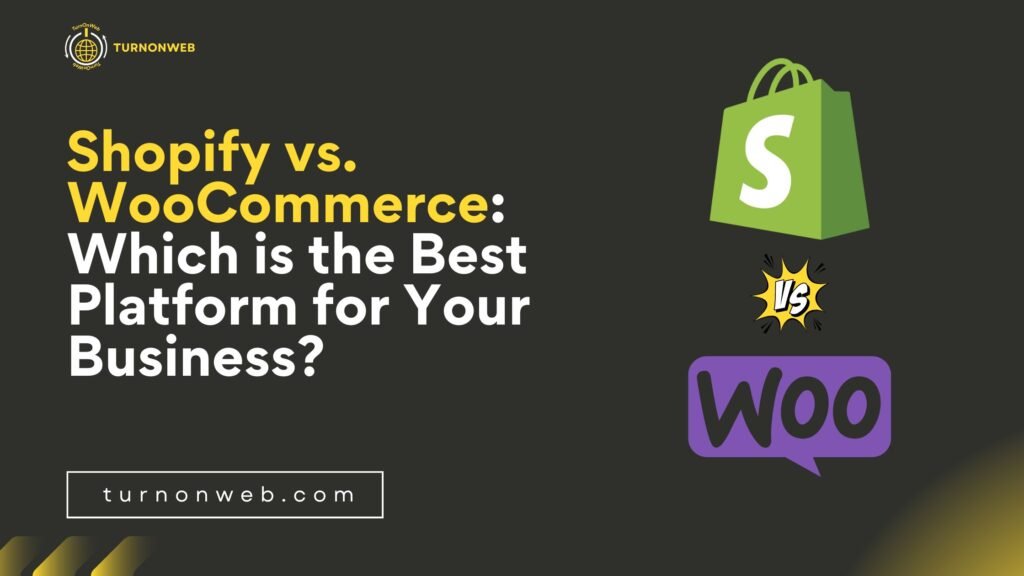Shopify vs. WooCommerce: Which Platform is Best for Your Business in 2024?

When it comes to starting an online store, one of the most critical decisions you’ll face is choosing the right eCommerce platform. Two names probably keep popping up in your search: Shopify and WooCommerce. Both are giants in the eCommerce world, but they cater to different types of users and business needs. So, how do you decide which one is the best fit for you?
In this detailed comparison, we’ll break down Shopify and WooCommerce, diving into key factors like ease of use, customization options, pricing, and scalability. By the end, you should have a clearer understanding of which platform will best serve your business.
1. Ease of Use
Shopify
Shopify is often hailed as the “plug-and-play” solution for online stores. It’s a fully hosted platform, meaning everything from hosting to security and backups is handled for you. As a result, it’s a hassle-free option for those who don’t have a technical background or want to avoid the complexity of setup and maintenance.
Pros:
- Beginner-friendly with an intuitive drag-and-drop editor.
- No need to worry about hosting, security, or updates.
- All features are integrated into one dashboard.
Cons:
- Limited customization if you’re tech-savvy and want full control.
Related: 5 Essential Tips for Successful Shopify Website Development
WooCommerce
WooCommerce, on the other hand, is a WordPress plugin. This means you’ll need to handle hosting, security, and site maintenance yourself (unless you go with a managed WordPress host). While this makes it more complex for beginners, it offers significantly more customization options for those familiar with WordPress.
Pros:
- Total control over your site’s design and functionality.
- Thousands of plugins and themes for limitless customization.
- Ideal for WordPress users.
Cons:
- Requires you to manage hosting, security, and updates.
- Steeper learning curve, especially if you’re new to WordPress.

2. Pricing
Shopify
Shopify offers a simple, tiered pricing structure. Their basic plan starts at $39 per month, while more advanced plans can go up to $399 per month, depending on your needs. Additionally, Shopify takes transaction fees (ranging from 2.9% + 30¢ per transaction) unless you use their own payment gateway, Shopify Payments.
Shopify Pricing Tiers:
- Basic Shopify: $39/month
- Shopify: $105/month
- Advanced Shopify: $399/month
One key factor to consider is that Shopify apps (third-party integrations) often come with additional costs, which can add up quickly.
You can visit the Shopify website to view the features of different price models
WooCommerce
WooCommerce is technically free, but there are costs associated with it. First, you’ll need to pay for hosting, which can range anywhere from $5 to $30+ per month, depending on the provider. Additionally, you might need to pay for premium themes, plugins, and SSL certificates. Transaction fees depend on the payment gateway you choose (e.g., PayPal or Stripe).
Potential Costs with WooCommerce:
- Hosting: $5–$30/month
- Premium themes: $30–$100 (one-time fee)
- SSL certificate: $0–$100/year
- Extensions/plugins: Varies, often a one-time or yearly fee
While WooCommerce gives you more flexibility to manage costs, expenses can sneak up as you start adding more advanced functionality to your store.
You can go through this blog for a better understanding of Woocommerce Pricing.
3. Customization and Flexibility
Shopify
Shopify is very straightforward, but this can be both an advantage and a disadvantage. If you prefer a simple and sleek interface where everything just works, then Shopify’s restrictive customization might not bother you. However, if you want to tweak everything down to the smallest detail, Shopify’s platform may leave you frustrated, as you are limited to its design templates and platform-specific apps.
Shopify has an app store with over 6,000 apps, allowing for customization in areas like SEO, email marketing, shipping, and inventory management. However, there is a reliance on third-party apps for added functionality, which can lead to higher overall costs.
Related: How to Optimize Your Shopify Store for Better SEO Performance
WooCommerce
WooCommerce’s biggest strength is its flexibility. Since it runs on WordPress, you have access to over 50,000 plugins and themes to customize your site however you want. Want to tweak the code? No problem, WooCommerce is open-source, giving you the freedom to modify almost every aspect of your store. Whether it’s SEO optimization, advanced analytics, or custom shipping options, WooCommerce can adapt to your exact specifications.
That said, with great flexibility comes more responsibility. You’ll need to manage updates, backups, and potential plugin conflicts.

4. Payment Options
Shopify
Shopify offers a wide range of payment gateways, including Shopify Payments, PayPal, Stripe, and many more. If you use Shopify Payments, you avoid additional transaction fees (other than the usual credit card processing fees). But if you choose a third-party payment gateway, Shopify will charge extra transaction fees on top of the payment provider’s fees.
WooCommerce
WooCommerce is compatible with nearly every payment gateway out there. From PayPal and Stripe to niche options like Square or Authorize.Net, WooCommerce doesn’t charge additional transaction fees on top of what the payment processor takes. This can be a significant advantage if you process a large volume of sales.
5. Scalability
Shopify
Shopify is built to scale with your business. As your store grows, you can easily upgrade to higher-tier plans for more features, better analytics, and support for higher sales volumes. Since Shopify handles hosting and security, you never have to worry about downtime or server issues when your traffic spikes. That being said, the cost increases significantly as you scale.
WooCommerce
WooCommerce can also scale, but the process can be more hands-on. As your site grows, you may need to upgrade your hosting plan and optimize your site’s performance. While this can be done, it requires more technical knowledge. However, WooCommerce’s open-source nature allows for unlimited growth as long as you can manage the backend or hire someone to do it for you.
Related: 6 Effective Strategies to Boost Your Online Presence Today

6. Support and Community
Shopify
Shopify offers 24/7 customer support via chat, phone, and email. They also have a comprehensive help center with tutorials, forums, and documentation. If you run into issues, Shopify’s team is available to help quickly, which is a significant benefit for non-technical users.
WooCommerce
WooCommerce doesn’t offer the same level of dedicated customer support as Shopify. Since it’s an open-source platform, you’ll largely rely on community forums, documentation, or hiring a WordPress developer to assist with more technical issues. Some managed WordPress hosts do offer WooCommerce-specific support, but it’s not always as immediate or comprehensive as Shopify’s.
How TurOnWeb Solutions Can Help You Choose Between Shopify and WooCommerce
When deciding between Shopify and WooCommerce for your business in 2024, the decision can feel overwhelming due to the pros and cons of each platform. That’s where TurOnWeb Solutions, a leading eCommerce website development company in Pune, steps in to simplify the process and ensure you make the right choice for your specific business needs. We are expertise in:
- Tailored eCommerce Strategy
- Custom Shopify Store Development.
- Custom WooCommerce Development
As an experienced eCommerce website development company in Pune, TurOnWeb Solutions is dedicated to delivering high-performance websites that drive sales and offer exceptional user experiences. Whether you opt for Shopify’s simplicity or WooCommerce’s flexibility, we offer the technical know-how and creative solutions to bring your vision to life. With a team of dedicated developers, designers, and strategists, we ensure that your online store not only looks good but also performs efficiently and scales as your business grows.
Conclusion: Which One is Right for You?
In the Shopify vs. WooCommerce debate, the right choice comes down to your business’s needs and technical expertise.
- If you’re a beginner or want a hassle-free solution, Shopify is your best bet. It’s easy to set up, doesn’t require technical skills, and offers excellent support.
- If you’re looking for flexibility and customization, and have some technical know-how (or can hire someone who does), WooCommerce is the way to go. You’ll have more control over your site and the ability to scale at your own pace.
Whichever platform you choose, it’s essential to keep your long-term business goals in mind. Both Shopify and WooCommerce have their strengths, so aligning those with your business needs will lead you to the right decision.
People Also Ask
1. What are the key differences between Shopify and WooCommerce?
4. Which platform has better support and customer service in 2024?
Shopify provides 24/7 customer support via live chat, email, and phone, making it ideal for users who need immediate help. WooCommerce relies on community forums, documentation, and the support provided by your web hosting service, which may not be as straightforward. While WooCommerce has a large community, support might not be as streamlined as Shopify’s dedicated service.
5. Can I customize my store more with WooCommerce or Shopify?
- QUICK LINKS
TurnOnWeb Solutions - Zoho's Partner
- QUICK LINKES
- SERVICES




